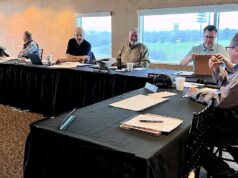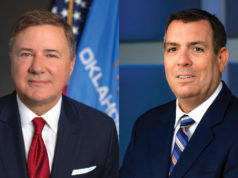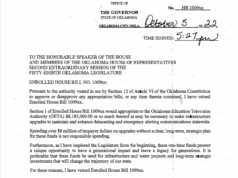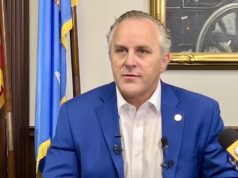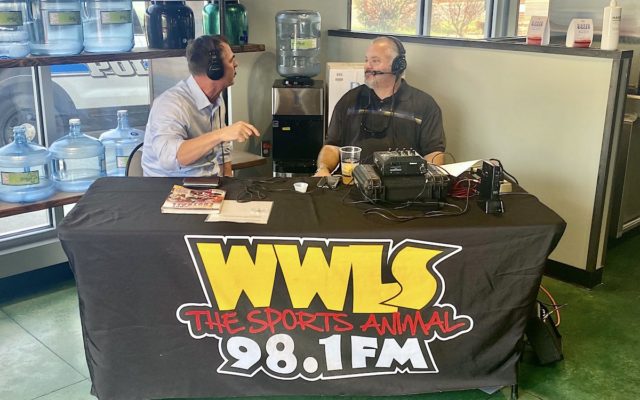
The forces that be sure seemed to want journalists to work this Labor Day weekend, with a series of actions in the world of Gov. Kevin Stitt’s administration standing out as notable.
In the first few days of September, Stitt saw the departure of a controversial cabinet secretary and the resignation of his general counsel. He also announced a new commissioner of public safety and axed a pair of physicians from the Oklahoma Health Care Authority board. In addition, the governor went on sports talk radio and relaunched what could be a key policy conversation within the Oklahoma Legislature in 2022.
Three of those events are chronicled below in an effort to provide additional perspective on how Oklahoma’s governmental guts churn. (Click the arrows below to navigate between the three summaries.)
1Stitt removes two OHCA board members
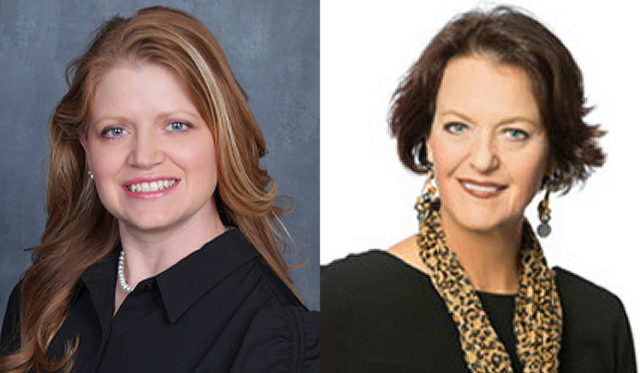
During a recent meeting of the Oklahoma Health Care Authority board, members voted 7-1 to table the attempted advancement of controversial rules supporting third-party management of the state’s Medicaid program, a main priority for Stitt. Tyler Talley of eCapitol.net outlined the Aug. 26 board vote on Twitter on Wednesday, Sept. 1.
Friday, word spread that Stitt had alerted two of the nine-member board’s five gubernatorial appointees that he was exercising his authority (authorized in 2019 by the Legislature) to remove them in the middle of their appointed terms.
Receiving the axe were Dr. Laura Shamblin and Dr. Jean Hausheer, the only two physicians on the board. Before close of business Friday, Stitt had already appointed a replacement for Shamblin: Susan Dell’Osso, the managing director and chief innovation officer for INTEGRIS health. (A replacement for Hausheer was named Tuesday afternoon following the original publication of this article: Gino DeMarco, Stitt’s former “PPE czar” who has also worked for the Oklahoma Tourism Department.)
The Oklahoma State Medical Association’s immediate past president, Dr. George Monks, released a statement criticizing Stitt’s removal of the physicians shortly after the conclusion of Saturday’s OU football season opener:
The Health Care Authority’s job is to oversee more than $2 billion taxpayer dollars and serve Oklahoma’s most vulnerable citizens, not rubber-stamp a governor’s political agenda.
Today, the governor demonstrated the politics are vastly more important than the health of Oklahomans as he eliminated two of the three female members and the only physicians from the OHCA Board of Directors. They were the only members who have the experience and knowledge needed to lead this agency that is so essential in the delivery of healthcare to those in need.
These public servants should be applauded for speaking truth to power in their 7-1 vote to uphold the Legislature’s stated intent to keep Oklahomans caring for Oklahomans. It is extremely disappointing—but sadly not surprising—that this administration would once again seek to stifle any dissent.
At the end of the day, the Legislature will still have the ultimate say, and we look forward to working with them to promote the best quality health care for our fellow Oklahomans.
Despite Monks’ mild slight of non-physician OHCA board members (who, apparently, do not “have the experience and knowledge needed to lead this agency”), the OSMA statement garnered a lot of attention on social media.
The criticism of Stitt was swift, although Hausheer had once been a controversial figure herself, campaigning statewide against the 2018 medical marijuana ballot initiative and then issuing a “demand” that the State Board of Health ban smokable forms of marijuana less than a month after Oklahomans strongly voted in favor of State Question 788. (Both Hausheer and Shamblin were among Stitt’s initial OHCA appointees in March 2019.)
Still, Stitt’s decision shows he is not done advocating to hire private companies for the implementation of managed care within the state’s Medicaid program. That likely means another showdown over the topic — in one form or another — during the 2022 regular session of the Oklahoma Legislature.
2Traber on sportsbook: ‘Can we get this thing done?’
Today @GovStitt dropped by to talk to Jim Traber during the broadcast. If you missed the segment, catch it later: https://t.co/D8OPhuFATT pic.twitter.com/dXqYHIWvdW
— The Sports Animal (@sportsanimal) September 1, 2021
Speaking of the 2022 legislative session set for February, Stitt teased another potential policy priority during a Sept. 1 guest appearance on WWLS the Sports Animal with Al Eschbach and Jim Traber.
As the conversation began, Traber instructed someone to bring Stitt a beverage, spectacularly foreshadowing the governor’s actions on OHCA board members two days later.
“You’ve got to listen to the governor,” Traber shouted in jest. “Listen — you’ll get fired out of here if you don’t listen to the governor, now.”
Traber’s first question to Stitt was about negotiations over the authorization of legal sports gambling and whether state leaders “can get this thing done.”
“We all know that you and the tribes have had a little bit of (a) head-on deal,” Traber said. “You love the tribes. We all love the tribes. Can we get this thing done, do you think?”
While many tribal citizens likely guffawed at Traber’s perception of amore between the governor and the sovereign nations, Stitt answered by referencing his court-invalidated negotiations with smaller tribes to breeze beyond his past compact dispute with larger tribes.
“What most people don’t know is that I actually negotiated with four of the tribes and approved sportsbook,” Stitt said. “In 2019, I met with the NFL, I met with both athletic directors at Oklahoma State and the University of Oklahoma — (Clay) Bennett with the Thunder. Because we knew this was a budding industry, and we need to keep up with other states. And unfortunately (we) got kind of caught up with the courts. But here’s the deal, I’m not going to negotiate a bad deal for the state of Oklahoma, so I’m looking at markets.”
Traber said “people aren’t going to stop gambling in Oklahoma” even if the state-tribal compacts are not updated to authorize sports betting here.
“You can ride over to Arkansas, you can go over to New Mexico, you can do it offshore,” Traber said. “So why not get this money in the state? I’m not ripping you, I just think people are frustrated. Maybe not blaming you or anybody else, but just saying, ‘Can we get this thing done?'”
Stitt replied: “Talk to the Legislature. We can get it done.”
Traber asked the age-old question by which lobbyists remain employed.
“What’s the Legislature have to do?”
Stitt repeated that his prior compact negotiations “basically got caught up” — read: shot down — “in the courts.”
“The court said I didn’t have the authority to negotiate those compacts. So the way it works now is — any compacts, the governor does with the Legislature’s approval,” Stitt said. “So we’re willing and able to get it done. This is something the Legislature is going to have to work on next session.”
After a commercial break, the trio returned and imagined how Traber would perform as Stitt’s campaign manager.
“You’d be in big trouble. Your campaign would be investigated,” Eschbach said. “He also might intimidate the opponent!”
Traber said that would be true.
“That’s what I would do,” he said. “I would just get in their face, you know that. ‘You don’t know what you’re talking about, get out of here.’ I’d be thrown out, no doubt.”
Traber then quizzed Stitt about his relationships with OSU football coach Mike Gundy, OSU athletic director emeritus Mike Holder, former OSU President Burns Hargis, former OU football coach Barry Switzer, former OU football coach Bob Stoops and OU President Joe Harroz. Stitt said they were all great.
Asked to identify things he wants to do if re-elected, Stitt ran through a list of policy changes he helped lead during his first three years and did not discuss the COVID-19 pandemic, despite growing criticism that he has not re-declared a state of emergency and has instead stood behind a law he signed prohibiting school-related mask mandates in certain circumstances.
“When I first ran, I felt like Oklahoma wasn’t achieving its potential. I think Oklahoma is the greatest state in the country. I hope everybody agrees with me. Raising a family, growing a business. It is the right place to be,” Stitt said. “I wanted to bring some of that optimism to Oklahoma. So, you hear me talk about ‘Top 10’ all the time, and that is what we are going to continue to push on.”
Eschbach returned to the topic of legalizing sports gambling in Oklahoma, asking how much state revenue it could generate.
“I haven’t looked at it since we kind of were working on it in 2019, so I’d hate to misquote,” Stitt said. “But I think some of those early states as they were rolling out — New Jersey, Illinois, Indiana; some of these other states that have already adopted it — I think they’re seeing $50 million-plus coming in, and that was as it was kind of gaining momentum in their states.”
New Jersey is the national leader in sports betting so far, with a 2020 handle of more than $6 billion, about $1.5 billion more than Nevada. Of the $6 billion wagered in New Jersey, the state received tax revenue of $50.9 million.
After briefly discussing how Oklahoma lottery revenues go to different parts of the state’s education sector, Stitt referred to legalized sports betting as “the wave of the future.”
“It’s already here,” Stitt said. “People are betting with bookies. They are betting out of state. So it is only natural. I look at market. What other states are doing — what are the market rates? And then doing it in our state.”
Traber channeled the impatience of voters who prefer government action over government chatter.
“Do I need to go — when the Legislature gets in session — and just walk in and take the gavel and hit it and just go, ‘Hey, fellas, let’s get this thing done.’ Do I need to go do that?” Traber asked. “Because I can get some stuff done once in a while.”
Stitt said Traber is “always welcome” at the Capitol.
“That would be fun to have Jim Traber Day.”
Traber laughed.
“Man, I’d get kicked out of there in a heartbeat,” he said. “Now I’d walk in in my shorts, is that OK?”
Stitt approved: “That’d be great.”
“Cause this is the way I dress. I’m a pig,” Traber said. “Earlier, we were talking about how I didn’t wash my sheets for an entire semester at OSU. An entire semester. Al, did you ever have a semester where you didn’t wash your sheets?”
Eschbach responded: “Probably.”
“Good. That’s very good,” Traber said, suddenly tossing a sarcastic question to Stitt. “Now, one of your troopers over here looks like you punched him in the face. Man, what happened? Did you get in a fight with him or what?”
Stitt confirmed that his bodyguard had some sort of mark on his face.
“He looks like a big man,” Traber said. “I don’t know if you want to go after him.”
Stitt replied like a trainer repping his fighter.
“Oh yeah. Oh yeah. His name is Tanner.”
Traber, then, anticipated this post.
“There’s going to be a story in the paper tomorrow: ‘Gov. Stitt punches his…’ You know how that goes,” Traber said. “I can cause some problems here.”
3Ostrowe: Gotta go, back to the private sector
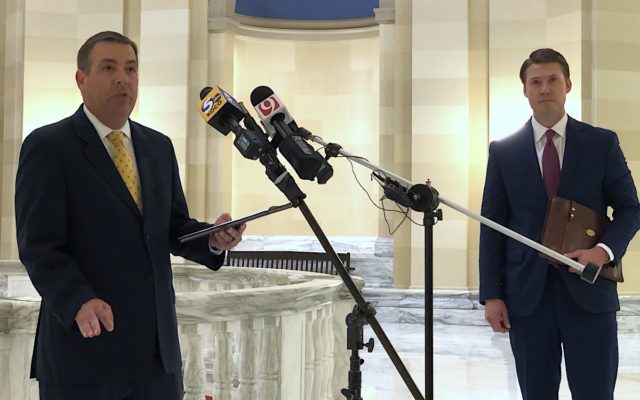
Speaking of problems, last you likely heard of Stitt’s secretary of digital transformation, David Ostrowe, he was predicting major problems for former Oklahoma Attorney General Mike Hunter, whose team had convinced a grand jury to indict Ostrowe for attempted bribery in December 2019. When a reported affair with another state employee purportedly caused Hunter’s abrupt resignation in late May, he dismissed the attempted bribery charge against Ostrowe.
Stitt announced Ostrowe’s formal resignation from the governor’s cabinet at 4:56 p.m. Friday before Labor Day weekend, a classic public relations move to trigger quick gamers and avoid weekend features.
Back on June 2, Ostrowe and his attorney, Matthew Felty, had conducted a press conference at the State Capitol. Felty and Ostrowe threatened to file a lawsuit, potentially against individuals (such as Hunter) and entities (like the Attorney General’s Office).
Felty alleged “abuse” of Oklahoma’s multi-county grand jury system, which saw its presiding judge, Tim Henderson, resign in March amid a sexual misconduct investigation.
“We believe that the grand jury system was abused in this case. We believe that misstatements were made to the grand jury,” Felty said after the presser. “Now, as to the broader issues, whether or not it is systemic, we will follow the evidence wherever it leads.”
The president of O&M Restaurant Group, which owns more than a dozen Burger King franchises and more than a dozen Taco Bell franchises in Oklahoma and Louisiana, Ostrowe had been rumored to have (seasoned) beef with Kim Bailey, an attorney with the Oklahoma Insurance Department who has familial connections to Oklahoma fast food markets. Hunter and Bailey reportedly were having an affair, with each finalizing a divorce subsequent to Hunter’s resignation.
Reached on Labor Day about his own resignation, Ostrowe declined to comment, but Felty said his client has one year to file a notice of tort claim for the planned lawsuit.
“We are under no pressing deadlines,” Felty said. “We have been in what I would call the evidence-gathering phase. We want to make sure that we’ve got all our ducks in a row, basically, before we submit our notice. (…) Sometimes who you don’t sue can be as important as who you do sue.”
After his June 2 press conference, Ostrowe declined to answer whether he had been contacted by or had spoken to federal authorities examining matters in Oklahoma.
“I’m not at liberty to say,” Ostrowe said, adding that he had heard “purely rumors” about “other issues” in Hunter’s office.
Ostrowe said in June that he believes he became a political target for powerful interests that oppose some of Stitt’s efforts.
“I have always viewed myself as a victim and a pawn in a greater scheme of trying to undermine the Stitt administration,” Ostrowe said. “Whether or not it was me or another secretary, I think at some point they were going to have someone indicted to purely undermine Gov. Stitt.”
Longtime Attorney General’s Office communications director Alex Gerszewski told KFOR in June that the charge against Ostrowe moved through the standard process of the multi-county grand jury.
“This case was referred to our office by state officials. The process undertaken was identical to every other case brought before the grand jury,” Gerszewski said. “Witness testimony is sworn under oath and lying before the grand jury is a felony. The grand jurors heard testimony and made the decision to issue an indictment.”
Transcripts of multi-county grand jury proceedings are typically secret, and jurors, attorneys, stenographers and others are sworn to secrecy. Decisions about disclosing grand jury proceedings rest solely with the attorney general. However, “no witness shall be prohibited from disclosing his testimony before the multi-county grand jury except for cause shown in a hearing before the presiding judge.”
In the matter of the now-dismissed December 2019 indictment of David Ostrowe, both the Oklahoma attorney general and the multi-county grand jury’s presiding judge have since resigned.
Talk about churning the governmental guts.
(Update: This article was updated at 2:35 p.m. Tuesday, Sept. 7, to include Stitt’s nomination of Gino DeMarco to the Oklahoma Health Care Authority Board.)








